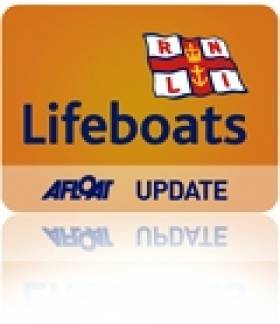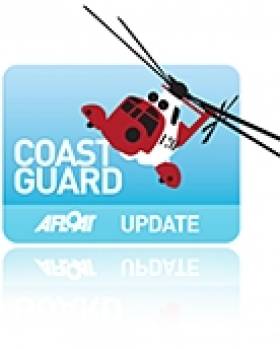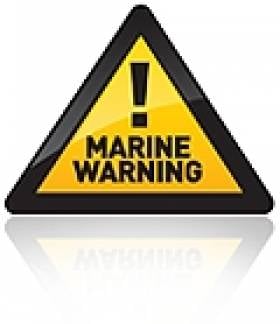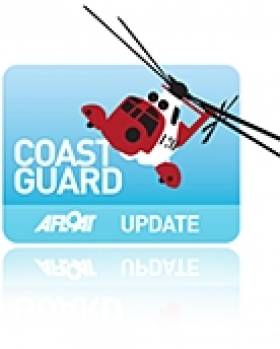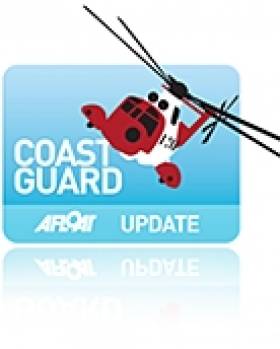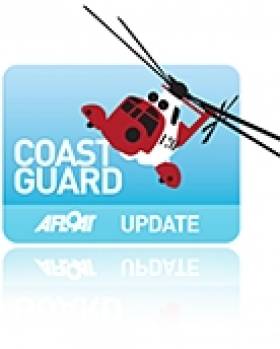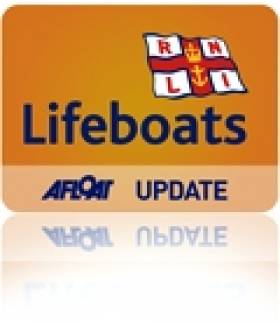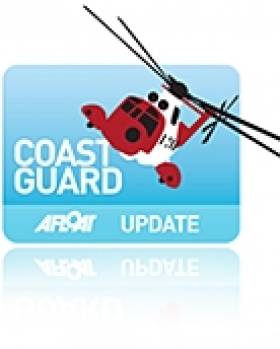Displaying items by tag: Rescue
Lough Derg Lifeboat Rescue Yacht Aground
At 18.37 the lifeboat launched with helm Colin Knight, Eleanor Hooker and Ger Egan on board. The lake was calm and with good visibility from the moonlight when night fell. The lifeboat came alongside the casualty vessel at 19.05hrs and found that the person on board was safe and unharmed. The lifeboat took soundings in and around the entrance to the private harbour and having decided that there was not sufficient depth for the draft of the vessel, took the vessel off the sandbar and then towed her to the safety of the public harbour of Kilgarvin Quay a short distance away.
The skipper of the vessel thanked the crew of the lifeboat. He said that he was 'very glad you came out, I was preparing myself to sit here all night'.
The lifeboat returned to station and was ready for service again at 20.50hrs
Related Safety posts
RNLI Lifeboats in Ireland
Safety News
Rescue News from RNLI Lifeboats in Ireland
Coast Guard News from Ireland
Water Safety News from Ireland
Marine Casualty Investigation Board News
Marine Warnings
Howth Coastguard and Lifeboat Rescue Teenager
The teenager had walked down a 100 foot steep cliff path to Jameson Beach on Howth Head with her friends when she collapsed. Gardai arrived on the scene and requested Coast Guard assistance to 'extract the female'.
The Howth Coast Guard Cliff Rescue Team were paged and arrived quickly at the scene. Medical care was given by the team, the casualty who was suffering from the cold was stabilised and placed in a stretcher for evacuation. Due to the terrain the quickest way to extract the casualty was via boat. Howth lifeboat quickly responded and the casualty was transferred back to the lifeboat station to a waiting ambulance.
The Coast Guard remind people that if they see someone who needs help on a beach to phone the new European wide emergency phone number, 112, and ask for the Coast Guard.
Weekend 'Super Moon' Increases Risk of Strandings
The moon will be at its closest to earth since 1993 on Saturday March 19th.
This "Lunar Perigee", or 'Super Moon' as some astrologers refer to it as, is the opposite of the "Lunar Apogee", when the Moon is furthest from Earth. Generally, the Moon looks about 12-14% larger at its perigee compared to its apogee.
This has the effect of causing very high and low tides, or increasing the range of the tide. This will expose large areas of beach and rocks which we normally don't see. Many people enjoy walking on our beaches and exploring these new areas of beach and in particular people enjoy picking shellfish to eat which become exposed during these very low tides.
The risk to the public will be of becoming stranded as the tide advances back in which can leave people in a position where they are cut off from the shore. Members of the public are cautioned to be aware of this risk and carry your mobile phone. Should you get in to trouble then call 112 or 999 and ask for Marine Rescue, giving your exact location and in particular if you are near to any conspicuous landmarks nearby to assist the Rescue Services in locating your whereabouts.
All seafarers, surfers, swimmers and divers should be aware of the increased tidal streams that will be running around our coast over the weekend; people could find themselves in peril as a result of these strong and fast tidal conditions which have not been experienced for some time now.
Public Meeting in Belfast on Coastguard Modernisation Proposals
The meeting will provide an opportunity for the community around the existing Belfast Maritime Rescue Coordination Centre (MRCC) to hear more about the proposals, ask questions of MCA representatives and air their views.
The meeting at Marine Court Hotel, 18-20 Quay Street, Bangor. BT20 5ED will be independently chaired and begin at 7:30pm. The meeting is expecting to draw to a close by 9:00pm.
The proposals for Coastguard modernisation, together with the consultation documents, can be found on the MCA website at www.mcga.gov.uk and www.dft.gov.uk
Fishermen Rescued From Sinking Vessel off Ardglass
Belfast Coastguard received a Mayday call at 5:54pm from the Newry registered vessel, which operates out of Ardglass, and immediately sent the Southdown and Portaferry Coastguard Rescue Teams to the scene. The launch was requested of the RNLI Portaferry inshore lifeboat. The Irish Coastguard Rescue Helicopter was tasked but was later stood down.
Steve Carson, Watch Manager, Belfast Maritime Rescue Coordination Centre, said:
"The crew aboard the fishing vessel were rescued by the inshore lifeboat and then taken to Ardglass Harbour where they received medical attention; one of the crew has since been taken to Downpatrick Hospital.
It is imperative to always ensure you are carrying the correct safety equipment and have it serviced regularly. Due to the prompt and appropriate action of the crew I am pleased to say they are all safe but shaken by their traumatic experience.
The rescue was successfully coordinated by Belfast Coastguard with assistance from their colleagues at Dublin, Liverpool and Holyhead Coastguard Stations.
The vessel has now been successfully refloated and is now alongside in Ardglass Harbour."
Stornoway Helicopter Reports Busiest Year Ever
Scottish Coastguard rescue helicopter based in Stornoway has recorded its busiest ever year after clocking up in excess of 200 callouts in 2010.
It is the first time the rescue helicopter team has reached the milestone figure for missions in any one year, traditionally responding to an average of 136 callouts between January 1 and December 31. Since the introduction of the new technology S92 helicopters in 2007 however this has risen to an average of 190.
Leading search and rescue (SAR) service provider CHC Helicopter has operated the service for the Maritime and Coastguard Agency in the UK since 2007 from four bases at Stornoway, Sumburgh, Lee on Solent and Portland. Through its membership of the Soteria consortium, it has been identified as the preferred bidder on the UK SAR-H program, a 25-year contract to provide helicopter-based SAR services from 12 bases throughout the UK.
Ian McLuskie, UK SAR Business Unit Leader at CHC said: "The past three years have been the busiest we've ever had in terms of callouts and this is due to the capability of the S92 aircraft which are able to fly faster and further than those previously in use.
"This increased operating range and speed allows us to get to locations quicker, the overall result is a reduction in the time taken to rescue and get medical aid to those in need. This has allowed the unit to be called out to a greater number of jobs throughout the year, bringing the search and rescue service to a greater number of people and helping to save many more lives."
The Stornoway unit conducted its 200th mission on December 10th when rescue helicopter R100 was scrambled to evacuate a 57-year-old female who required urgent hospital treatment after experiencing breathing difficulties. The patient was transferred to Raigmore Hospital in Inverness.
Man Drowns Trying to Rescue Dog
A man has been pronounced deceased at Lancaster Hospital after being rescued from the River Lune in Lancaster this afternoon.
At 2.12 pm a member of the public called Liverpool Coastguard to report that they could see a man in the water near the weir of the River Lune in Halton. Further information yielded that the man had jumped into the river after his dog had got into difficulty, but that the man himself could not swim.
Liverpool Coastguard tasked Knott End and Morecambe Coastguard Rescue Teams, the Morecambe RNLI inshore lifeboat and hovercraft, swift water rescue technicians from Lancashire Fire and Rescue Services and a rescue helicopter from RAF Valley.
At 3pm the man was recovered and treated by waiting paramedics. He was transferred to Lancaster Hospital but was later pronounced deceased.
Liverpool Coastguard Watch Manager Paul Parkes said:
"This is a tragic incident where a dog owner has entered the water to try and rescue his pet and sadly, has not survived. We understand that for many people, a dog can be like a member of the family, but we would advise that people dial 999 and call the Coastguard if your pet gets into difficulty on the coast as we can send teams with specialist training and equipment to perform a rescue."
New Pontoon Key to Saving Stranded Whales, Dolphins
A new pontoon intended to refloat marine animals such as beached whales and dolphins along the Atlantic seaboard was demonstrated at the weekend ahead of the Galway Science & Technology Festival.
The Irish Times reports that divers, scientists and local volunteers were among those participating in the training exercise on Gurteen beach, near Roundstone, which involved rescuing and refloating a dummy pilot whale.
Dr Simon Berrow of the Irish Whale and Dolphin Group (IWDG) which ran the exercise said he hoped other coastal communities would follow the example with their own training sessions, given the growing number of strandings along Ireland's west coast.
The new pontoon - which was put on display in the festival exhibition at NUI Galway on Sunday - was purchased with funds raised by the local community and a BBC television team producing the latest series by popular adventurer Monty Halls.
Lifeboat Assists Sinking Fishing Vessel in Cork Harbour
Yesterday while out on exercise in a squally southwesterly force four winds the crew of the Ballycotton lifeboat Austin Lidbury received details of a 26 foot fishing vessel that had sunk off Roches Point, at the mouth of Cork Harbour. The two crew members had taken to a liferaft and were retrieved by a fishing vessel in the area. Crosshaven lifeboat also launched and was first on scene. Ballycotton lifeboat was stood down and returned to station.
Related Safety posts
RNLI Lifeboats in Ireland
Safety News
Rescue News from RNLI Lifeboats in Ireland
Coast Guard News from Ireland
Water Safety News from Ireland
Marine Casualty Investigation Board News
Marine Warnings
Two Men Rescued from Welsh Cliffs
Milford Haven Coastguard received a 999 call at 7.15 pm this evening reporting that the two men were stranded in heavy surf at the bottom of cliffs at Devil's Bridge near Broadhaven. Broadhaven Coastguard Rescue Team was requested to attend the scene, Littlehaven RNLI inshore lifeboat was requested to launch and the rescue helicopter from RAF Chivenor was scrambled.
There were heavy sea conditions on scene with strengthening winds and so a decision was made that the safest course of action would be to lower a coastguard from Broadhaven Coastguard Rescue Team to the stranded men, then bring both men back up the cliff face. This operation would be backed up by the Dale Coastguard Rescue Team and illumination of the cliff face would be provided by the lifeboat from the bottom and the helicopter overhead.
The two men, both dressed in wetsuits were recovered by the coastguard rescue team to the top of the cliff. A third man (the first informant) was also assisted back up the cliffs from the cliff path where he had been observing the ongoing situation and reporting back to Milford Haven Coastguard.
Bob Peel, Milford Haven Coastguard Watch Manager says:
"When all of the rescue assets arrived on scene, we had to make an assessment about what would be the safest way of getting the two men to safety. Due to the swell, wind conditions and height of the cliffs (about 200 ft), we decided that using the coastguard rescue team would be the best option. I am pleased to say that all three men are safe and well."



























